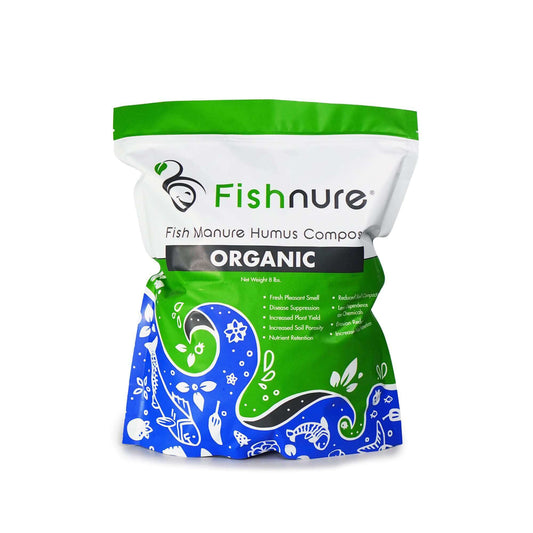
The Benefits of Organic Fertilizer in 2023: Nurturing Plants and Planet Naturally
Share
Introduction

In the ever-evolving landscape of agriculture and environmental consciousness, organic farming practices have taken center stage as a sustainable and ecologically-friendly approach to cultivating crops. Central to this movement is the utilization of organic fertilizers, which have gained immense recognition for their multifaceted benefits. This article explores the advantages of organic fertilizers in 2023, shedding light on their positive impact on human health, the environment, natural ecosystems, sustainability, and energy conservation.
Human Health
The shift towards organic fertilizers has not only transformed farming practices but also positively impacted human health. Conventional agricultural methods often involve the heavy use of synthetic fertilizers, which can leave behind residues on crops that make their way into our diets. These chemical residues have been associated with potential health risks, including adverse effects on the nervous system, hormonal disruption, and even carcinogenicity.
Organic fertilizers, derived from natural sources like compost, animal manure, and plant materials, offer a safer alternative. They reduce the risk of exposure to harmful synthetic chemicals, ensuring that the food we consume is healthier and more wholesome. Moreover, the organic matter in these fertilizers improves soil structure and nutrient retention, leading to increased mineral content in crops and ultimately enhancing their nutritional value.
Environment
The environmental benefits of organic fertilizers are profound, contributing to the preservation of ecosystems and the reduction of pollution. Unlike synthetic fertilizers that can leach into groundwater and contaminate water bodies, organic fertilizers release nutrients slowly, reducing the risk of nutrient runoff. This minimizes the chances of harmful algal blooms, which can devastate aquatic ecosystems and compromise water quality.
Moreover, the production and application of organic fertilizers have a lower carbon footprint compared to their synthetic counterparts. Synthetic fertilizers are energy-intensive to manufacture, requiring substantial fossil fuel consumption. In contrast, organic fertilizers are often produced locally, using renewable resources and promoting sustainable energy practices.

Natural Ecosystems
Organic fertilizers play a vital role in supporting natural ecosystems by promoting biodiversity and enhancing soil health. The gradual release of nutrients from organic sources mimics nature's nutrient cycling process, maintaining a balance that benefits not only cultivated crops but also surrounding vegetation and wildlife. Healthy soils enriched with organic matter support a diverse array of soil organisms, from beneficial bacteria to earthworms, that contribute to nutrient cycling and plant growth.
In addition, the use of organic fertilizers in agriculture reduces the risk of soil degradation and erosion, which can have devastating effects on ecosystems. By maintaining soil structure and preventing nutrient leaching, organic fertilizers contribute to the long-term health and resilience of both agricultural and natural landscapes.
Sustainability

Sustainability is at the heart of the organic fertilizer movement, aligning with the principles of conserving resources for future generations. The adoption of organic fertilizers fosters sustainable agricultural practices in several ways.
-
Renewable Resource Utilization: Organic fertilizers are derived from renewable resources such as crop residues, animal manure, and compost. This reduces the reliance on non-renewable resources and fossil fuels, promoting long-term sustainability.
-
Reduced Chemical Dependency: Organic fertilizers reduce the need for synthetic chemicals in agriculture. This not only minimizes the negative impact of chemical runoff but also supports beneficial soil microbes that contribute to plant health.
-
Soil Health Preservation: The use of organic fertilizers enhances soil health by promoting microbial activity, improving soil structure, and increasing organic matter content. Healthy soils are more resilient to stressors and require fewer inputs to maintain productivity.
Energy
The energy benefits of organic fertilizers extend beyond their lower carbon footprint during production. These fertilizers contribute to energy conservation in multiple ways.
-
Energy-Efficient Nutrient Release: Organic fertilizers release nutrients gradually, in sync with plant growth stages. This natural nutrient release pattern reduces the need for frequent applications, saving energy otherwise required for multiple fertilizer applications.
-
Less Intensive Production Process: The production of synthetic fertilizers involves energy-intensive processes like ammonia synthesis. Organic fertilizers are typically produced using less energy-intensive methods, reducing overall energy consumption.
-
Localized Production: Many organic fertilizers can be produced on-site or locally, reducing the energy needed for transportation and distribution. This supports community-level sustainability efforts.
Conclusion
In 2023, the benefits of organic fertilizers transcend mere agricultural practices. They touch upon diverse aspects of human health, environmental conservation, ecosystem resilience, sustainable agriculture, and energy efficiency. By opting for organic fertilizers, individuals, farmers, and industries alike contribute to a more harmonious relationship with the planet, nurturing both the well-being of humanity and the health of the environment.
References
-
Biebl, J. (2021). Fertilizer Runoff: Causes, Consequences, and Solutions. Yale Environment 360.
-
Reganold, J. P., & Wachter, J. M. (2016). Organic agriculture in the twenty-first century. Nature Plants, 2(2), 15221.
-
Bongiorno, G., Basche, A. D., Kovács, A. K., & Acutis, M. (2019). Soil organic carbon dynamics under cover crop-based, organic rotational no-till farming. Agriculture, Ecosystems & Environment, 283, 106589.
-
Magdoff, F. R. (2007). Organic farming: science and practice. Agroecology: The ecology of sustainable food systems.
-
Seufert, V., Ramankutty, N., & Foley, J. A. (2012). Comparing the yields of organic and conventional agriculture. Nature, 485(7397), 229-232.
-
Rajendran, S., Hui, T. Y., Ma, N. L., Kassim, A. H., Zaman, N. Q., & Zahid, E. M. (2017). Organic farming enhances soil organic carbon content and sequestration in paddy soils. Sustainability, 9(7), 1144.



